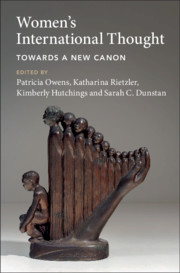Book contents
- Women’s International Thought: Towards a New Canon
- Women’s International Thought: Towards a New Canon
- Copyright page
- Contents
- Preface and Acknowledgments
- Introduction
- 1 Field and Discipline
- 2 Geopolitics and War
- 3 Imperialism
- From “Impressions of the Second Pan-African Congress” (1921)
- From “The London West India Interest in the Eighteenth Century” (1921)
- From Slavery and the French and Haitian Revolutions (1925)
- From Economic Development in the Nineteenth Century (1932)
- From Native Administration in Nigeria (1937)
- From The Berlin West African Conference, 1884–1885 (1942)
- From “Chinese Milk Africans in the Caribbean” (1946)
- From Britain and the United States in the Caribbean (1954)
- Jessie Fauset
- Lillian M. Penson
- Anna Julia Cooper
- Lilian Knowles
- Margery Perham
- Sibyl Crowe
- Amy Jacques Garvey
- Mary Macdonald Proudfoot
- 4 Anticolonialism
- 5 International Law and International Organization
- 6 Diplomacy and Foreign Policy
- 7 World Peace
- 8 World Economy
- 9 Men, Women, and Gender
- 10 Public Opinion and Education
- 11 Population, Nation, Immigration
- 12 Technology, Progress, and Environment
- 13 Religion and Ethics
- Index
Sibyl Crowe
from 3 - Imperialism
Published online by Cambridge University Press: 12 April 2022
- Women’s International Thought: Towards a New Canon
- Women’s International Thought: Towards a New Canon
- Copyright page
- Contents
- Preface and Acknowledgments
- Introduction
- 1 Field and Discipline
- 2 Geopolitics and War
- 3 Imperialism
- From “Impressions of the Second Pan-African Congress” (1921)
- From “The London West India Interest in the Eighteenth Century” (1921)
- From Slavery and the French and Haitian Revolutions (1925)
- From Economic Development in the Nineteenth Century (1932)
- From Native Administration in Nigeria (1937)
- From The Berlin West African Conference, 1884–1885 (1942)
- From “Chinese Milk Africans in the Caribbean” (1946)
- From Britain and the United States in the Caribbean (1954)
- Jessie Fauset
- Lillian M. Penson
- Anna Julia Cooper
- Lilian Knowles
- Margery Perham
- Sibyl Crowe
- Amy Jacques Garvey
- Mary Macdonald Proudfoot
- 4 Anticolonialism
- 5 International Law and International Organization
- 6 Diplomacy and Foreign Policy
- 7 World Peace
- 8 World Economy
- 9 Men, Women, and Gender
- 10 Public Opinion and Education
- 11 Population, Nation, Immigration
- 12 Technology, Progress, and Environment
- 13 Religion and Ethics
- Index
Summary
This study is primarily a diplomatic not a legal one, its object being to set the Berlin West African Conference of 1884–5 in its true relation to contemporary history. The importance of the conference as a landmark in international law, has in fact been exaggerated, for when its regulations are studied it can be seen that they all failed of their purpose. Free trade was to be established in the basin and mouths of the Congo; there was to be free navigation of the Congo and the Niger. Actually highly monopolistic systems of trade were set up in both these regions. The centre of Africa was to be internationalised. It became Belgian. Lofty ideals and philanthropic intentions were loudly enunciated by delegates of every country to the conference. Only the vaguest and most unsatisfactory resolutions were passed concerning the internal slave trade, the one humanitarian question of any importance to be discussed at its sittings; whilst the basin of the Congo, if not the Niger became subsequently, as everyone knows, the scene of some of the worst brutalities in colonial history.
- Type
- Chapter
- Information
- Women's International Thought: Towards a New Canon , pp. 172 - 176Publisher: Cambridge University PressPrint publication year: 2022



